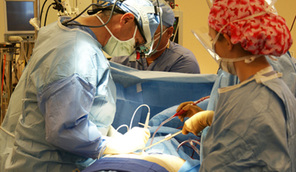 When discussing revascularisation procedures (coronary artery bypass grafting (CABG) or stents), patients often ask: How long will my bypass/stent last? There is no easy answer to this question. I have patients with stents implanted 20 years ago which are still working perfectly and also known people who had a CABG in the 1980’s where all the grafts are in excellent condition. Conversely patients may return rapidly after surgery with graft failure or develop critical in-stent restenosis within months of angioplasty. Results from randomised clinical trials of stents versus surgery such as the SOS and SYNTAX favour CABG as superior treatment compared to stenting. CABG appears to be associated with a lower likelihood of repeat revascularisation. But there is a problem with these trials. Inherent clinician bias usually favours repeating angiograms in patients treated with stents who develop symptoms after the procedure compared to those patients who have received treatment with CABG. Since the clinician and the patients are not blinded to the original treatment this belief that surgery is a more robust and reliable method of revascularisation is likely to increases the rate of repeat angiography which leads to a high rate of repeat revascularisation. So what is the rate of CABG vein graft occlusion? A recent paper looked at this question in 1829 patients who had a coronary angiogram within 12-18 months after CABG and were then followed for a further 3 years. Within 18 months after CABG 43% of patients (770/1829) had at least one vein graft occlusion. The identification of this occlusion was associated with a 5-fold increase in repeat revascularisations procedures although it did not lead to a higher number of heart attacks or deaths compared to patients whose grafts were all patent. There rate of revascularization procedures within 14 days of angiography demonstrating a vein graft occlusion shows the power of the occlulostenotic reflex as discussed before in an earlier blog. Since the angiography was protocol, and not symptom, driven the identification of the stenosis on an angiogram was enough to result in a repeat revascularisation procedure with a stent. What is the reason for the graft occlusion? Surgical technique, quality of the vein graft and target vessels or is it perhaps that the stenosis didn’t need bypassing in the first place. The FAME study using pressure wire showed that 20% of coronary arteries with significant stenosis (70-90%) on an angiogram were not associated with ischemia and in such cases vein graft failure could easily ay occur without clinical consequence or symptoms. So when answering the question about the longevity of a bypass graft we should say that nearly half of patients will lose at least one graft within 18 months of surgery but the chance that it will cause harm to the patient is low unless someone discovers that it is occluded.
1 Comment
Nola Bayley
18/3/2018 07:42:57 am
I had a cardiac MRI and the report made no mention of my previous stents or bypass. Report read that everything was absolutely normal. Two months later I had a heart attack because the bypass was totally blocked? I had another stent. I'm very confused. Thank you.
Reply
Your comment will be posted after it is approved.
Leave a Reply. |
Dr Richard BogleThe opinions expressed in this blog are strictly those of the author and should not be construed as the opinion or policy of my employers nor recommendations for your care or anyone else's. Always seek professional guidance instead. Archives
August 2023
Categories
All
|
 RSS Feed
RSS Feed

